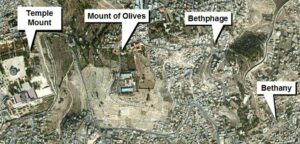
Today, we’re going to look at historical events that changed the hearts of men who were eyewitnesses of Jesus, who then changed the world. These written accounts found in Scripture could be referred to as “Impact Events.”
I submit to you that the resurrection of Jesus Christ, His ascending up into heaven before their very eyes, and the Triumphal Entry into Jerusalem were three major impact events. How do we know these things are true?
Let’s open with the Gospel they believed and preached: 1 Corinthians 15:3-8 states:
For I delivered to you first of all that which I also received: that Christ died for our sins according to the Scriptures, 4 and that He was buried, and that He rose again the third day according to the Scriptures, 5 and that He was seen by Cephas, then by the twelve. 6 After that He was seen by over five hundred brethren at once, of whom the greater part remain to the present, but some have fallen asleep. 7 After that He was seen by James, then by all the apostles. 8 Then last of all He was seen by me also…
Many convincing proofs; overwhelming evidence including secular historians that wrote about Jesus, fulfilled prophecies, and of course, hundreds of eye witnesses.
In the outstanding book, “I Don’t Have Enough Faith to be an Atheist,” Dr. Frank Turek and Norman Geisler make a defense of the gospel and there are some fascinating points in chapter 11, “Top Ten Reasons we Know the New Testament Writers told the Truth.”
Virtually overnight, the writers of the New Testament abandoned many of their long-held sacred beliefs and practices, adopted new ones, and did not deny their testimony under persecution or threat of death!
These are some of the 1,500-year-old institutions they suddenly gave up:
–The animal sacrifice system– they replace it forever by the one perfect sacrifice of Christ.
–The binding supremacy of the Law of Moses– they say it’s powerless because of the sinless life of Christ. Jesus fulfilled the Law.
–Strict monotheism– they now worship Jesus, the God-man, despite the fact that 1) their most cherished belief has been, “Hear, O Israel: The Lord our God, the Lord is one” (Deut. 6:4); and 2) man-worship has always been considered blasphemy and punishable by death.
–The Sabbath– they no longer observe it even though they’ve always believed that breaking the Sabbath was punishable by death (Ex. 31:14).
–Belief in a conquering Messiah– Jesus is the opposite of a conquering Messiah. He’s a sacrificial lamb (at least on his first visit!).
And it’s not just the New Testament writers who do this– thousands of Jews, including Pharisee priests (Acts 6:7), convert to Christianity and join the New Testament writers in abandoning these treasured beliefs and practices.
J.P. Moreland helps us understand the magnitude of these devout Jews giving up their established institutions virtually overnight:
[The Jewish people] believed that these institutions were entrusted to them by God. They believed that to abandon these institutions would be to risk their souls being damned to hell after death. Now a rabbi named Jesus appears from a lower-class region. He teaches for three years, gathers a following of lower- and middle-class people, gets in trouble with the authorities, and gets crucified along with thirty thousand other Jewish men who are executed during this time period.
But five weeks after he’s crucified, over ten thousand Jews are following him and claiming that he is the initiator of a new religion. And get this: they’re willing to give up or alter all five of the social institutions that they have been taught since childhood. Something very big was going on.
How do you explain these monumental shifts if the Bible isn’t true. By the way, you can save a lot of time by asking a person if Christianity were true, would they believe it? If they say “no,” move on. They’re not open or interested in the truth no matter how much evidence you present.
Not only do these new Christians abandon their long-held beliefs and practices, they also adopt some new radical ones:
-Sunday, a work day, as the new day of worship
–Baptism as a new sign that one was a partaker of the new covenant (as circumcision was a sign of the old covenant)
-The Trinity – believing God in three persons but one divine essence.
–Communion as an act of remembrance of Christ’s sacrifice for their sins
Communion is especially inexplicable unless the Resurrection and the Bible are true. Why would Jews make up a practice where they symbolically eat the body and drink the blood of Jesus?
How else would you explain such a swift and monumental shift in Jewish thinking and practice? An impact event is something that is so dramatic it changes you or your surroundings forever.
Where were you on September 11, 2001? Most of us remember exactly what we were doing and where that day when terrorists attacked America.
There are few events that all four gospel writers included, but they all provide details about the Triumphal Entry of Jesus into Jerusalem. Another impact event.
Just days before Passover and before entering Jerusalem, Jesus spent time with Lazarus, Mary, and Martha.
…six days before the Passover, Jesus came to Bethany, where Lazarus was who had been dead, whom He had raised from the dead. 2 There they made Him a supper; and Martha served, but Lazarus was one of those who sat at the table with Him. John 12:1-2,
 The day before Passover, a crowd was getting stirred up – at Bethany.
The day before Passover, a crowd was getting stirred up – at Bethany.
Now a great many of the Jews knew that He was there; and they came, not for Jesus’ sake only, but that they might also see Lazarus, whom He had raised from the dead. But the chief priests plotted to put Lazarus to death also, 11 because on account of him many of the Jews went away and believed in Jesus. [Jn 12:9-11]
So, rather than give God the glory for another amazing, miraculous sign, they plotted to kill Lazarus and Jesus! Jesus would enter Jerusalem the very next day.
Jesus instructs His disciples regarding preparations for His triumphal entry into Jerusalem. Bethpage was a small town near Bethany where they spent the night.
JOHN 12:12-19 states:
The next day a great multitude that had come to the feast, when they heard that Jesus was coming to Jerusalem, 13 took branches of palm trees and went out to meet Him, and cried out: “Hosanna! ‘Blessed is He who comes in the name of the Lord!’ The King of Israel!” 14 Then Jesus, when He had found a young donkey, sat on it; as it is written:
15 “Fear not, daughter of Zion; Behold, your King is coming, Sitting on a donkey’s colt.” 16 His disciples did not understand these things at first; but when Jesus was glorified, then they remembered that these things were written about Him and that they had done these things to Him.
17 Therefore the people, who were with Him when He called Lazarus out of his tomb and raised him from the dead, bore witness. 18 For this reason the people also met Him, because they heard that He had done this sign. 19 The Pharisees therefore said among themselves, “You see that you are accomplishing nothing. Look, the world has gone after Him!”
Luke provides other prophetic details Matthew and John do not:
Now as He drew near, He saw the city and wept over it, 42 saying, “If you had known, even you, especially in this your day, the things that make for your peace! But now they are hidden from your eyes. 43 For days will come upon you when your enemies will build an embankment around you, surround you and close you in on every side, 44 and level you, and your children within you, to the ground; and they will not leave in you one stone upon another, because you did not know the time of your visitation.” Luke 19:41-44
The utter destruction of Jerusalem in 70 AD was God’s judgment for their failure to recognize and receive Jesus as their Messiah.
Jesus planned it all out in detail before He was even born, and after thirty years on earth, His time had come. He would NOW allow people to publicly worship Him. Days before He was arrested and crucified, He headed to Jerusalem – on a donkey – as His disciples were basically doing crowd control.
The King was coming.
As predicted by the Prophet Daniel, the exact day of Jesus’ grand entrance into Jerusalem was here. Expectation filled the multitude during the Jewish feast of Passover as stories about Jesus had spread across the entire land.
 In the Old Testament, Zechariah 9:9 predicts a sign of the Messiah, and states:
In the Old Testament, Zechariah 9:9 predicts a sign of the Messiah, and states:
Rejoice greatly, …Shout in triumph, O daughter of Jerusalem! Behold, your king is coming to you; He is just and endowed with salvation; Humble, and mounted on a donkey; Even on a colt, the foal of a donkey.
Jesus fulfilled this prophecy which was a sign to all those who knew the Holy Scriptures. The King was coming, and He would enter the city riding on a donkey.
Doctor and gospel writer, Luke explained that as Jesus approached the Mount of Olives the whole crowd began to praise God joyfully with loud voices (why?) for all the miracles they saw Jesus do.
The multitudes welcomed Jesus with the well-known words of Psalm 118.
I will praise You, For You have answered me, And have become my salvation. The stone which the builders rejected Has become the chief cornerstone. This was the Lord’s doing; It is marvelous in our eyes. This is the day the Lord has made; We will rejoice and be glad in it. Save now, I pray, O Lord; O Lord, I pray, send now prosperity. 26 Blessed is he who comes in the name of the Lord! We have blessed you from the house of the Lord. (PSALM 118:21-26)
Remember when Jesus was born and the Magi came looking for the King of the Jews? Matthew records the fact that ‘all Jerusalem was troubled.’ (Matt. 2:3) That sense of fear turned to anticipation and excitement 33 years later.
Most of the crowd now spread their coats in the road for Jesus to go over, and others cut branches from the trees and put them in the road. Matthew wrote:
The crowds going ahead of Him, and those who followed, were shouting,
“Hosanna to the Son of David; Blessed is He who comes in the name of the Lord; Hosanna in the highest!”
10 When He had entered Jerusalem, all the city was stirred, saying, “Who is this?” 11 And the crowds were saying, “This is the prophet Jesus, from Nazareth in Galilee.” Matthew 21:9-11
As we know from history, the jubilation didn’t last, because the mob shouting “Hosanna” would just days later cry out “Crucify Him!”
Check out what the Apostle John wrote in the Book of Revelation about the future Millennial kingdom, following the Great Tribulation:
“After this I looked, and behold, a great multitude that no one could number, from every nation, from all tribes and peoples and languages, standing before the throne and before the Lamb, clothed in white robes, with palm branches in their hands, 10 and crying out with a loud voice, “Salvation belongs to our God who sits on the throne, and to the Lamb!” Revelation 7:9-10
The Lamb of God took away the sins of the world! Do you believe in Him?
He had a mission to accomplish – which He did – because if you recall, some of the last words of Jesus after being executed by the Jews on a Roman cross were:
It is finished.
The King had conquered. The writer of Hebrews put it this way:
“[L]et us run with endurance the race that is set before us, 2 looking to Jesus, the founder and finisher of our faith, who for the joy that was set before him endured the cross, despising the shame, and is seated at the right hand of the throne of God.” Hebrews 12:1-2
This is a God worthy of our worship. The King of Kings and Lord of Lords. All others are counterfeits and copycats. Make no mistake: all religious pathways do not lead to the living God. Jesus is the way the truth and the life (John 14:6).
That historic entrance of Jesus through the Eastern Gate in Jerusalem was a world changing impact event. When He returns, His feet will stand on the Mount of Olives once again, and He will enter the holy city through that same Eastern Gate!
Are you ready for the Return of the King of Kings?
Aren’t you glad Jesus was determined and undaunted in His mission?
Knowing the Jews wanted to kill Him, He entered Jerusalem in the most public way possible: as royalty at a parade in His honor! He would rebuke Peter from trying to stop Him, allow Judas to betray Him, Mary to anoint Him for burial, and when He was arrested and abandoned by His followers, He strengthened Himself in the Lord.
The cross had to come before the kingdom. We were reminded at the beginning of this message that the gospel was clearly proclaimed and believed. Jesus is returning to judge the living and the dead, and His kingdom will have no end.
In this world we’ll have trouble, but Jesus overcame it all and destroyed the last enemy of mankind: death. Coronavirus or not, Christians are not to grieve as those who have no hope or fear as those who have no Savior.
To believers, Jesus said, “I am with you always, even to the end of the age.” He is our hope; He is our peace; He is our salvation. And “whoever calls upon the name of the Lord will be saved.” (Romans 10:13) That’s why Jesus entered Jerusalem triumphantly.
Close in prayer.
*Video courtesy of Freedom Fellowship Church, Kaukauna, WI

